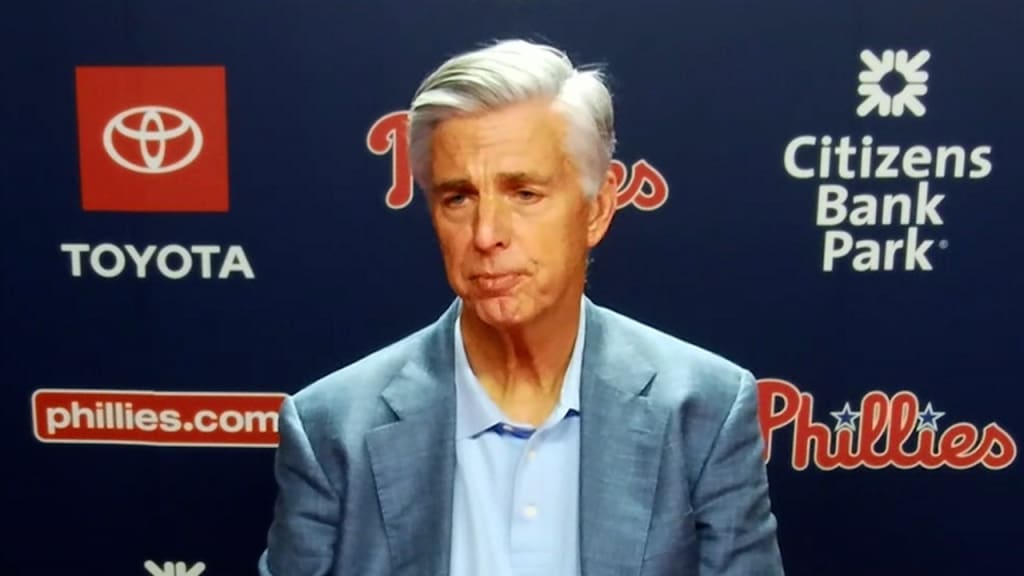
PHILADELPHIA -- The Phillies had the first, eighth, third, 14th and 15th overall picks in the 2016-20 MLB Drafts, respectively. They invested millions in upgrades to their player development system. They introduced technology-based instruction they believed would catapult them from a 99-loss club in 2015 to a perennial powerhouse in the National League East.
But more than five years later, the Phillies have surprisingly little to show for it.
So president of baseball operations Dave Dombrowski announced on Tuesday sweeping changes to the organization’s Minor League operations department. Assistant general manager Bryan Minniti, who oversaw the organization’s player development department since September 2017, and player development director Josh Bonifay, who served in the role since October 2018, have been removed from their positions, effective immediately. Dombrowski also parted ways with assistant general manager Scott Proefrock, who had been with the organization since 2008.
“I wasn’t satisfied with some things on the player-development aspect, from observation and past history,” Dombrowski said. “Then when you start trying to sort out who’s responsible for what, sometimes that’s hard to do. You start to ask questions. The best thing to do was to approach it from a fresh perspective and get a fresh start. So that’s what we’re going to do. We’re going to hire someone to align the department for us.”
Minniti and Proefrock will serve as consultants in 2022. Bonifay has been offered a pro scouting job for 2022. Assistant general manager Jorge Velandia will oversee the Phillies’ player development system on an interim basis, until a permanent hire is made.
“I think we can turn it very quickly,” Dombrowski said. “Personally, I do. I don’t think it has to take long, but it’s also not going to be overnight.”
But if the Phillies are not starting from scratch, they might be close. MLB Pipeline ranks Philadelphia’s farm system 27th in baseball. Baseball America ranks them 28th. Dombrowski said he does not put much stock into farm system rankings, but the proof is in the pudding: the Phillies did not draft or develop enough talent under former general manager Matt Klentak, who left his job following the 2020 season.
Mickey Moniak, Adam Haseley, Scott Kingery, Spencer Howard and Alec Bohm are a few players who have not developed as expected for one reason or another. Case in point: Cole Irvin is the organization’s most productive Draft pick from 2016-20, according to Baseball Reference. The fifth-round pick from 2016 has a 1.6 WAR over three seasons. But he had a -0.6 bWAR with the Phillies from 2019-20 before they traded him to the A’s for cash in January. He has a 1.9 bWAR this season with Oakland.
The Phillies’ cumulative picks from 2016-20 have a combined 2.2 WAR, which is tied with Houston for the 11th-lowest mark in baseball. Remove Irvin from the equation and it drops to a combined 0.6, which would be the fourth-lowest total.
“I don't know if there's a common denominator,” Dombrowski said. “But I do think if we're going to be the club we need to be, we need to be better at getting players over the hump and producing good players from within the system. That's mandatory. I mean, you have to be able to produce your own players. And you have to get some. Now sometimes, if they're good, you might make a big trade with them even to bring over some other good players -- but we have to do a better job at getting more players to the big leagues that are good players.”
It starts with more people pulling in the same direction.
It is no secret that the Phillies modernized their baseball operations department over the past few years. It needed to be done. Yet despite preaching a desire to strike a balance, many “old-school” thinkers were marginalized or pushed out.
“I don’t think we have enough people on the same page,” Dombrowksi said. “I don’t even want to say swinging one way or the other. I think it’s going to be imperative that, if we’re going to be as good as we can be, that you buy into the way we do it or not be here. And I think honesty is extremely important. … It’s different if you disagree and we talk about it and you say, “OK, I’m good. I got my piece in,’ and we move forward, but if you can’t do that …”
Dombrowski said assistant general manager Ned Rice will remain with the organization. Dombrowski signed Rice to a two-year extension shortly following his hiring in December. Klentak and Rice were the architects of Philadelphia's baseball operations department from 2016-20, including the direction of player development. Dombrowski said Rice’s primary responsibility moving forward is in an administrative capacity.
“I'll listen to him and he's been involved with a lot of different things,” Dombrowski said. “We have meetings, he'll participate. He can talk to me, he knows a lot of people in baseball; he can call them. He's happy to talk to them. He's happy to talk about what our needs are, what our interests are as we talk at the Trade Deadline. He'll be involved in everything that we have, but as far as making the ultimate decisions, no.”
Proefrock joined the Phillies in November 2008. Notably, he pushed for them to sign Pedro Martinez as a free agent in July 2009, and he pushed former Phillies president David Montgomery to increase their offer to sign Cliff Lee in December 2010.
Dombrowski said he has no timetable for making new hires, but he wanted to get a jump on things because player development is too important.
“You have to make sure the people who are running things for you are the people who are going to correct it,” he said. “I believe in a balance of traditional methods, with bringing as much contemporary information you possibly can. It's a big job. It's a hard job. It's not easy. To me, if I say, 'OK, 30 years ago, well, we did this.' And we did, but we've learned a lot more since then. So you look back, well, how do you incorporate both of them together? It's hard. Really smart people that I know struggled with doing both of them. So we need to make sure it comes from me on down that this is what we believe: contemporary, and yet, traditional.”


